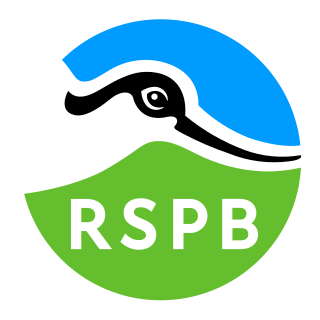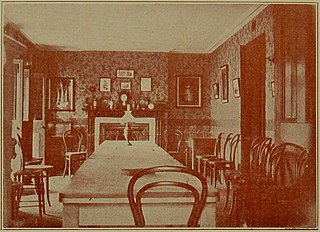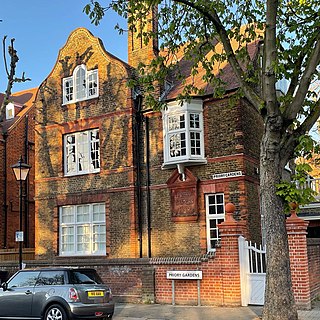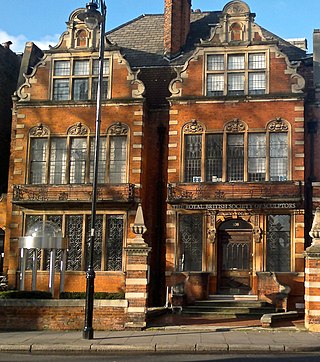
Dowsing is a type of divination employed in attempts to locate ground water, buried metals or ores, gemstones, oil, claimed radiations (radiesthesia), gravesites, malign "earth vibrations" and many other objects and materials without the use of a scientific apparatus. It is also known as divining, doodlebugging or water finding, or water witching.

The Royal Society for the Protection of Birds (RSPB) is a charitable organisation registered in England and Wales and in Scotland. It was founded in 1889. It works to promote conservation and protection of birds and the wider environment through public awareness campaigns, petitions and through the operation of nature reserves throughout the United Kingdom.
The British Dragonfly Society is a conservation organisation in the United Kingdom. It was founded in 1983 and its aims are to promote and to encourage the study and conservation of dragonflies and damselflies and their natural habitats, especially in the United Kingdom.

The Vegetarian Society of the United Kingdom (VSUK) is a British registered charity. It campaigns for dietary changes, licenses Vegetarian Society Approved trademarks for vegetarian and vegan products, runs a cookery school and lottery, and organises National Vegetarian Week in the UK.
Plant Heritage, formerly known as the National Council for the Conservation of Plants and Gardens (NCCPG), is a registered charity and a botanical conservation organisation in the United Kingdom. It was founded in 1978 to combine the talents of botanists, horticulturalists and conservationists with the dedication of keen amateur and professional gardeners. The mission statement of the organisation declares that "The NCCPG seeks to conserve, document, promote and make available Britain and Ireland's rich biodiversity of garden plants for the benefit of everyone through horticulture, education and science." Specifically, the aims of the organisation are to:

A charitable organization or charity is an organization whose primary objectives are philanthropy and social well-being.

The Botanical Society of Britain and Ireland (BSBI) is a scientific society for the study of flora, plant distribution and taxonomy relating to Great Britain, Ireland, the Channel Islands and the Isle of Man. The society was founded as the Botanical Society of London in 1836, and became the Botanical Society of the British Isles, eventually changing to its current name in 2013. It includes both professional and amateur members and is the largest organisation devoted to botany in the British Isles. Its history is recounted in David Allen's book The Botanists.

The Nautical Archaeology Society (NAS) is a charity registered in England and Wales and in Scotland and is a company limited by guarantee.

The Victorian Society is a UK charity and amenity society that campaigns to preserve and promote interest in Victorian and Edwardian architecture and heritage built between 1837 and 1914 in England and Wales. As a statutory consultee, by law it must be notified of any work to a listed building which involves any element of demolition or structural alteration.

The Marine Society & Sea Cadets is seafarers' charity in the United Kingdom and the national organisation for sea cadets. It was formed in 2004 when the Sea Cadets and The Marine Society merged. It is a registered charity in England, Wales and Scotland.
The British Entomological and Natural History Society or BENHS is a British entomological society. It is based at Dinton Pastures Country Park in Reading, England.

The Royal Society of Sculptors (RSS) is a British charity established in 1905, which promotes excellence in the art and practice of sculpture. Its headquarters are a centre for contemporary sculpture on Old Brompton Road in South Kensington, London. It is the oldest and largest organisation dedicated to sculpture in the UK. Until 2017, it was known as the Royal British Society of Sculptors.

Edward Dowse was a U.S. Representative from Massachusetts. Born in Charlestown in the Province of Massachusetts Bay, Dowse moved to Dedham in March 1798 to escape the yellow fever epidemic in Boston. He purchased five acres of land on both sides of the Middle Post Road, today known as High Street. He lived in an already existing house at first, and then built a home on the land in 1804. His brother-in-law was Samuel Nicholson, the first captain of USS Constitution.

The United Charities Building, also known as United Charities Building Complex, is at 105 East 22nd Street or 287 Park Avenue South, in the Gramercy Park neighborhood of Manhattan, New York City, near the border of the Flatiron District. It was built in 1893 by John Stewart Kennedy, a wealthy banker, for the Charity Organization Society. It was designated a National Historic Landmark in 1991 for the role the Charity Organization Society played in promoting progressive social welfare policies, including the development of academic disciplines in that area.

The Rev. Edmund Dowse House is a historic house in Sherborn, Massachusetts. The Greek Revival house was built in 1838 for the Rev. Edmund Dowse, the first pastor of the Evangelical Society, whose sone, William Bradford Homer Dowse, was a major benefactor of the town. The house was listed on the National Register of Historic Places in 1986.

This is a list of the National Register of Historic Places listings in Custer County, Nebraska. It is intended to be a complete list of the properties and districts on the National Register of Historic Places in Custer County, Nebraska, United States. The locations of National Register properties and districts for which the latitude and longitude coordinates are included below, may be seen in a map.

The William R. Dowse House, more commonly known as the Dowse Sod House, is a sod house in Custer County in the central portion of the state of Nebraska, in the Great Plains region of the United States. It was built in 1900 and occupied until 1959. After a long period of neglect, it was restored beginning in about 1981, and opened as a museum in 1982.

The Dowse Art Museum is a municipal art gallery in Lower Hutt, New Zealand.

Warwick Stephen Freeman is a New Zealand jeweller.

The 1870 Londonderry City by-election was held on 15 February. It was a ministerial by-election, triggered by the appointment of Liberal Party member of parliament Richard Dowse as Solicitor-General for Ireland. The election was strongly contested by the Irish Conservative Party at a time when such by-elections were increasingly unchallenged. During this period the Catholic population of Londonderry tended to support the Liberals while the Protestant population supported the Conservatives. Dowse won, with a slightly reduced majority, and the result has been cited as evidence for the increasing co-operation between Episcopalian and Presbyterian voters in Ulster.
















